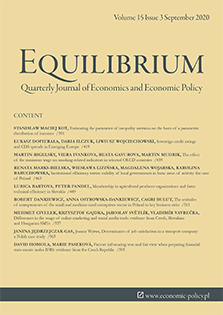Institutional efficiency versus stability of local governments in basic areas of activity: the case of Poland
Institutional efficiency versus stability of local governments in basic areas of activity: the case of Poland
Author(s): Renata Marks-Bielska, Wiesława Lizińska, Magdalena Wojarska, Karolina BabuchowskaSubject(s): Agriculture, Energy and Environmental Studies, Government/Political systems, Policy, planning, forecast and speculation, Economic development
Published by: Instytut Badań Gospodarczych
Keywords: institutional efficiency of local governments; stability of tasks; activity of local government; synthetic measure;
Summary/Abstract: Research background: In the last decade, the importance of institutions in determining economic processes and the economic growth is increasingly emphasized. Only a few papers deal with the efficiency of institutions, especially at a local level. Thus, a question arises whether the local authorities, in their pursuit of performing the assigned tasks, make every effort to attain a high level of efficiency? Purpose of the article: The aim of the paper was to determine the relationships between institutional efficiency and identified areas of stability achieved by local governments in their basic roles. Supplementary aim of this study was to analyze the relationship between the type of a municipality (urban, rural or mixed urban-rural) and the efficiency and stability of undertaken tasks. A research hypothesis was put forth, assuming that the institutional efficiency of municipal governments depends on the level of stability in basic areas of activity pursued by a given municipality. Supplementary aim of this study was to analyze and assess the relationship between the type of a municipality (urban, rural or mixed urban-rural) and the efficiency and stability of undertaken tasks. Methods: An accumulated synthetic index of institutional efficiency and partial indices of efficiency in five areas: economic and spatial, financial, administrative, human resources management in municipal offices, provision of social, cultural and educational services, were derived from data acquired from public statistics (Local Data Bank) and from direct investigations conducted in 2015/2016 in 1220 municipalities out of 2479 ones present in Poland. The method for obtaining the index was linear ordering of multi-feature objects. Findings & Value added: The analyses have confirmed the hypothesis assuming that there is a relationship between the institutional efficiency of local governments and stability of the tasks they performed. These dependences varied in individual provinces of Poland. It is more beneficial for local governments to raise stability by attaining some improvement in these areas where it is low, but not at the expense of those areas where it is high. A specific group of municipalities consisted of urban-rural communities. Their complex and diverse structure must meet the challenge of performing their tasks in specific conditions (urban and rural areas).
Journal: Equilibrium. Quarterly Journal of Economics and Economic Policy
- Issue Year: 15/2020
- Issue No: 3
- Page Range: 463-487
- Page Count: 25
- Language: English

